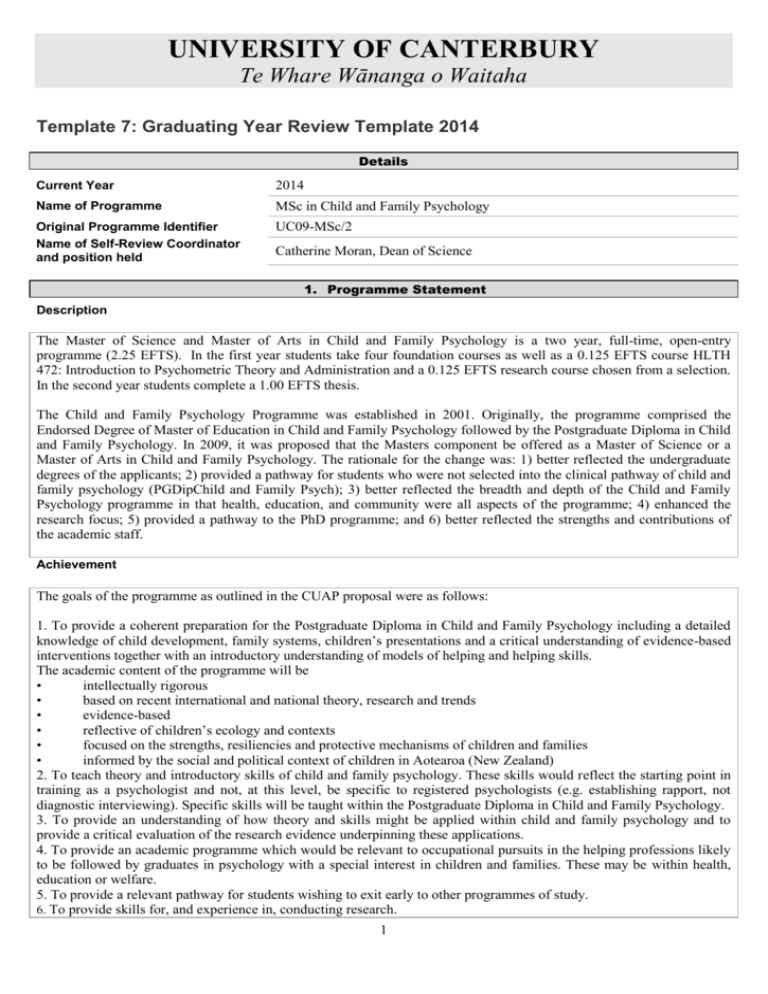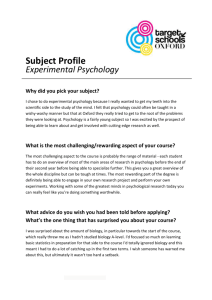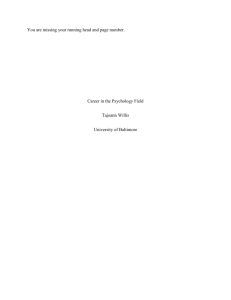MSc in Child and Family Psychology
advertisement

UNIVERSITY OF CANTERBURY Te Whare Wānanga o Waitaha Template 7: Graduating Year Review Template 2014 Details Current Year 2014 Name of Programme MSc in Child and Family Psychology Original Programme Identifier Name of Self-Review Coordinator and position held UC09-MSc/2 Catherine Moran, Dean of Science 1. Programme Statement Description The Master of Science and Master of Arts in Child and Family Psychology is a two year, full-time, open-entry programme (2.25 EFTS). In the first year students take four foundation courses as well as a 0.125 EFTS course HLTH 472: Introduction to Psychometric Theory and Administration and a 0.125 EFTS research course chosen from a selection. In the second year students complete a 1.00 EFTS thesis. The Child and Family Psychology Programme was established in 2001. Originally, the programme comprised the Endorsed Degree of Master of Education in Child and Family Psychology followed by the Postgraduate Diploma in Child and Family Psychology. In 2009, it was proposed that the Masters component be offered as a Master of Science or a Master of Arts in Child and Family Psychology. The rationale for the change was: 1) better reflected the undergraduate degrees of the applicants; 2) provided a pathway for students who were not selected into the clinical pathway of child and family psychology (PGDipChild and Family Psych); 3) better reflected the breadth and depth of the Child and Family Psychology programme in that health, education, and community were all aspects of the programme; 4) enhanced the research focus; 5) provided a pathway to the PhD programme; and 6) better reflected the strengths and contributions of the academic staff. Achievement The goals of the programme as outlined in the CUAP proposal were as follows: 1. To provide a coherent preparation for the Postgraduate Diploma in Child and Family Psychology including a detailed knowledge of child development, family systems, children’s presentations and a critical understanding of evidence-based interventions together with an introductory understanding of models of helping and helping skills. The academic content of the programme will be • intellectually rigorous • based on recent international and national theory, research and trends • evidence-based • reflective of children’s ecology and contexts • focused on the strengths, resiliencies and protective mechanisms of children and families • informed by the social and political context of children in Aotearoa (New Zealand) 2. To teach theory and introductory skills of child and family psychology. These skills would reflect the starting point in training as a psychologist and not, at this level, be specific to registered psychologists (e.g. establishing rapport, not diagnostic interviewing). Specific skills will be taught within the Postgraduate Diploma in Child and Family Psychology. 3. To provide an understanding of how theory and skills might be applied within child and family psychology and to provide a critical evaluation of the research evidence underpinning these applications. 4. To provide an academic programme which would be relevant to occupational pursuits in the helping professions likely to be followed by graduates in psychology with a special interest in children and families. These may be within health, education or welfare. 5. To provide a relevant pathway for students wishing to exit early to other programmes of study. 6. To provide skills for, and experience in, conducting research. 1 The programme has met its aims with the panel noting the following: 1) That the programme is nationally and internationally important and meets national benchmarks for such programmes 2) that the programme addresses the teaching of theory and introductory skills as noted in CFPY 604 3) the students who continue on in the PGDip Child and Family Psychology have a breadth of employment opportunities and are successfully contributing to the field. Students were questioned specifically about research skills and in particular the thesis component of the MSc and MA. Students acknowledged that it provided excellent learning and the review panel noted that students recognised the importance of the Science-Practitioner model through their research experience. For those students not admitted to the PGDip Child and Family Psychology, most continue on to complete their Master’s degree in Arts or Science and/or transfer to Psychology. (c) Changes There were some changes recommended in 2014 to the MSc and MA in Child and Family Psychology as a result of the review. The key changes that were recommended were reconsideration of the 1.0 EFTS weighting of the thesis, particularly with the first year being a 1.25 EFTs weighting. Other recommendations for the first year of the MA and MSc included a review of content and structure of CFPY 601 and 603 to ensure overlap between the two courses. It was further recommended that CFYP 604 be divided into two 15-point courses so that the theory and practical skills could be taught separately. It was noted by the panel that these were recommendations to enhance the programme but as it stood the programme met all key outcomes as presented. An additional recommendation from the review panel was with regard to the “family” content of the programme. It was felt that there was a heavier focus on the “child” component. One suggestion was to broaden the choice of courses the students could take in the first year of the MA/MSc. These recommendations are currently being considered by the programme. 2. Review Processes E Account of Review Processes. The Graduating Year Review of the MSc and MA in Child and Family Psychology was conducted under the umbrella of the comprehensive programme review of the Postgraduate Diploma in Child and Family Psychology that was undertaken in 2013. As part of that review, the Master of Science/Master of Arts in Child and Family Psychology was considered. The review involved submissions from internal and external stakeholders including staff, current and past students, and employers and clinical supervisors in Psychology and Child and Family Psychology. The review panel comprised Neville Blampied (Chair), Catherine Moran (Dean of Science), Prof. Tony Ward (Victoria University), Prof Kim Halford (University of Queensland), and Mr. Martin Kelly. 3. Review Outcomes (a) E Acceptability The MSc and MA in Child and Family Psychology are meeting the goals as outlined in the CUAP proposal. While some minor adjustments were suggested by the review team in the 2014 report, the degree continues to attract students and the students have noted that they are well prepared for future work in Child and Family Psychology. The students also noted the importance of the research component to their overall work as a practitioner in Child and Family Psychology. (b) Assessment procedures and student performance Taught courses in the Master of Science and Master of Arts in Child and Family Psychology have a combination of lectures, seminars, small group work and laboratories along with other appropriate teaching methods. The 1.00 EFTS thesis uses a standard postgraduate research supervision structure, complying with university policy for Masters’ theses. Each student has an approved topic and an approved primary and a secondary supervisor. The research thesis can be completed over two years (and four for part time students) which skews the completion rates relative to the numbers enrolled. Student learning is assessed using a mix of formative and summative procedures, including essays, design and presentation of seminars, practical exercises and role-plays, examinations, and a research thesis. (c) Data Table 1A: Numbers enrolling and completing MSc Year Projected No. Enrolling Actual No. Enrolled Full-time Parttime EFTS No. Completed Withdrawals 2011 21* 17 13 4 14.4 1 0 2 2012 22* 32 20 12 26 4 1 2013 23* 27 18 9 18.6 4 0 Table 1B: Numbers enrolling and completing MA Year Projected No. Enrolling Actual No. Enrolled Full-time Parttime EFTS No. Completed Withdrawals 2011 21* 15 12 3 15.4 0 0 2012 22* 18 13 5 14 3 1 2013 23* 25 20 5 23.2 2 0 The MSc/MA in Child and Family Psychology underwent two recent reviews as part of the review of the Postgraduate Diploma in Child and Family Psychology (from which this GYR report is derived) as well as an Accreditation Review. While the MA/MSc in Child and Family Psychology on its own does not form an accredited programme, it contributes to the overall requirements of the Psychologists registration Board for registration as a Psychologist. The graduates of this programme meet this standard. (e) Continuation or Discontinuation The Review Panel unreservedly commended the programme on meeting its goals and obligations and there is no doubt it should be continued. The Academic Administration Committee considered the Graduating Year Review. It noted the low completion rate which is skewed as mentioned in the report by the length of time students can and do take to complete the thesis. 3





